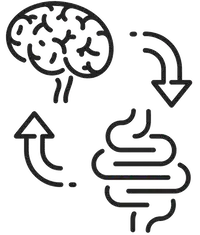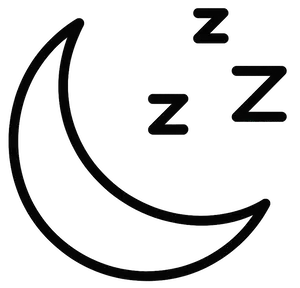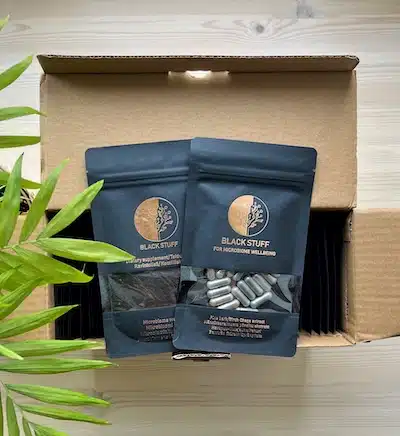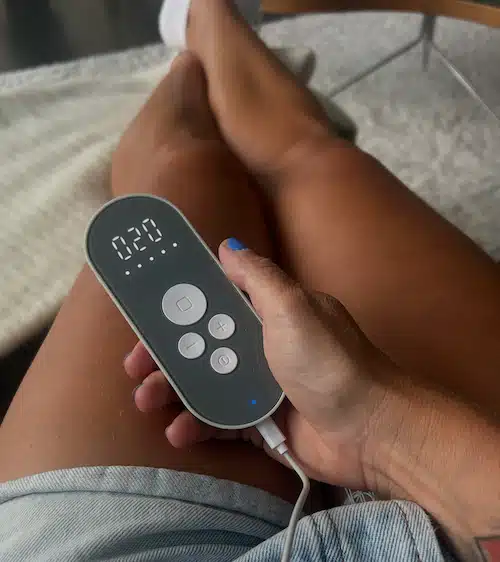Beginner’s Guide to Optimizing Mental Health
Support your mental health naturally
Your gut and brain are in constant communication. Discover how a balanced microbiome can reduce anxiety, boost mood, and support mental clarity.

Regular movement boosts endorphins, brain function, and stress resilience. From strength training to daily walks, find out how exercise supports mental wellness.
Quality sleep is essential for emotional stability, memory, and stress recovery. Learn simple strategies to improve your sleep and support your mental resilience.

Discover science-backed supplements like magnesium, omega-3s, and adaptogens that can naturally support your focus, calm, and emotional balance.
Activating the vagus nerve can calm your nervous system, reduce anxiety, and enhance focus. Explore both high-tech tools and natural ways to improve vagal tone.

Breathwork, nature time, and grounding techniques help shift you from fight-or-flight into rest-and-digest. Simple practices for deep mental reset.
What you eat directly impacts how you feel. Support your brain and mood with targeted nutrients, blood sugar balance, and anti-inflammatory foods.

Functional mushrooms and adaptogenic herbs like lion’s mane and ashwagandha offer gentle, natural support for clarity, mood, and stress resilience.
Mental health issues are on the rise — and the numbers speak for themselves. According to the National Institute of Mental Health, nearly 1 in 4 adults in the U.S. experienced a mental illness in 2022. That’s over 59 million people struggling with their mood, energy, or ability to cope with everyday life.
While traditional approaches like therapy and medication have their place, many of these struggles are deeply connected to how we eat, sleep, move, and manage stress. If you’re wondering how to optimize your mental health, you’ve come to the right place.
At Hacks4Wellness, our belief is clear: today’s ultra-processed diets, exposure to toxins, chronic stress, and nervous system dysregulation are major contributors to the mental health crisis. But that also means we have power — through lifestyle, habits, and targeted support — to make a real difference.
This guide explores natural, science-backed strategies to optimize mental health through foundational biohacks. Whether you’re feeling anxious, unmotivated, emotionally drained, or simply want to feel more grounded and focused — these tools can help.
Let’s explore what works — from gut health and sleep to movement, micronutrients, and nervous system support.

Your gut isn’t just for digestion — it’s one of your most powerful engines influencing mood, cognition, and stress response. Through a bidirectional communication system known as the gut-brain axis, your gut and brain are in constant dialogue. This connection runs through the vagus nerve, hormones, immune signals, and metabolic pathways.
Neurochemical production: Up to 90 % of serotonin, our brain’s “feel-good” neurotransmitter, is produced in the gut .
Dysbiosis & mood: Imbalanced gut flora and inflammation are associated with anxiety, depression, and cognitive issues.
Research spotlight: A review found that probiotics can improve anxiety and depressive symptoms by modulating gut-brain.
Eat more fermented foods, like kefir, sauerkraut, kimchi, and miso. Aim for 25–30 g of fiber daily — from whole fruits, veggies, legumes, and whole grains.
Minimize ultra‑processed foods, artificial additives, and unhealthy fats.
Support gut lining with broth, colostrum, or L‑glutamine. Stay hydrated — your gut needs water for proper function.

Want a natural boost for your microbiome?
Black Stuff is rich in humic & fulvic acids, polyphenols, and lignins, acting as a powerful prebiotic to feed beneficial gut bacteria. These compounds support nutrient absorption, detoxification, and cellular gut integrity.
I take a daily dose of Black Stuff and have noticed smoother digestion, clearer mood, and more emotional balance.
A healthier gut = a healthier mind. Start simple:
👉 Add one serving of fermented food daily.
👉 Include one fiber source at every meal.
👉 Consider a targeted gut support supplement like Black Stuff.
👉 Feel the positive ripple effect in your mood, focus, and calm.

Sleep is not a luxury — it’s a non-negotiable for mental health. It affects everything from your mood and focus to your hormone balance, resilience, and ability to regulate emotions.
In fact, if there’s one area to start when optimizing mental well-being, this is it. Sleep is when your brain does its deepest work, such as processing emotions, detoxifying the brain (via the glymphatic system), and repairing neurotransmitters and regulating hormones.
Without enough sleep, the nervous system becomes fragile. Anxiety increases, emotional reactivity spikes, and even the gut-brain connection suffers.
While individual needs vary, most people need 7–9 hours of high-quality sleep each night to maintain mental balance. If you’re consistently sleeping less than 6 hours, your body is likely operating in a low-grade survival mode — even if you don’t realize it. If you need help with sleep optimization, take a look at our guide on this subject.
Prioritizing sleep is not a weakness. It’s one of the most powerful biohacks for mental and emotional strength.

Here are simple, effective tools to improve both sleep quality and quantity:
👉 Stick to a consistent bedtime (preferably before 11 PM)
👉 Get sunlight early in the day to anchor your circadian rhythm
👉 Avoid caffeine after 2 PM
👉 Eat your last meal 2–3 hours before bed
👉 Keep your room dark, cool, and quiet
👉 Try magnesium glycinate or L-theanine for sleep support
👉 Wind down with a screen-free routine — reading, stretching, or journaling
Exposure to blue light in the evening disrupts melatonin production — your sleep hormone — making it harder to fall and stay asleep. I use Swanwick’s Blue Light Blocking Glasses every evening to reduce digital light exposure. They’re a simple but powerful way to support better sleep, especially if you’re working late or scrolling before bed.
Offer: Get 10% off your order at Swanwick with code KAJSA

Your mental health doesn’t just live in your mind — it lives in your nervous system. And one of the most powerful ways to regulate that system is through the vagus nerve.
The vagus nerve is the main communication highway between your brain and your body. It’s a key part of your parasympathetic nervous system — the one responsible for “rest and digest” functions. When the vagus nerve is activated, your body feels safe. Your heart rate slows, your digestion improves, your breathing deepens, and your stress response softens.
If your vagal tone is low, your body stays in fight-or-flight mode longer than necessary. This can lead to anxiety, sleep problems, mood swings, and even gut issues.
I’ve never dealt with major mental health diagnoses, but I’ve absolutely had seasons of stress, anxiety, and difficulty winding down — especially at night.
Since I started using vagus nerve stimulation devices, my experience has completely shifted.
Here’s what I use:
Pulsetto – worn on the neck for 6 minutes every morning
Nurosym – worn on the ear for 20 minutes every evening before bed
Both devices use gentle electrical impulses to stimulate the vagus nerve, helping signal safety to the nervous system. The results?
Better sleep, less anxiety, more calm.
It’s become one of my most grounding rituals.
Note: I’m not sponsored by either brand — I just genuinely love the results.

👉 Reduced anxiety and emotional reactivity
👉 Improved sleep quality and depth
👉 Better focus and cognitive clarity
👉 Enhanced digestion and gut-brain connection
👉 Reduced inflammation and improved heart rate variability (HRV)
Your vagus nerve is like a switchboard between stress and safety — and learning how to activate it is one of the most powerful ways to support your mental well-being.
Whether you use a device or go the natural route, make vagus nerve stimulation part of your daily calm-down toolkit.
If you’re not ready for a device, there are still plenty of effective ways to activate your vagus nerve daily:
Cold exposure (cold showers or cold face rinses)
Deep, slow breathing (4-7-8 or box breathing)
Humming, chanting, or singing
Gargling water vigorously
Tapping or gentle neck massage
Meditation, mindfulness, or prayer
These practices help bring your body into a regulated state, especially when done consistently over time.




What you eat doesn’t just affect your body — it shapes your brain, your mood, your energy, and how resilient you feel day to day. Proper nutrition for brain health is a cornerstone of optimizing mental health through food-first strategies.
Modern diets, especially those filled with ultra-processed foods (UPFs), are now being linked to a surge in mental health issues — including anxiety, depression, and cognitive decline. These foods are low in nutrients, high in additives, and designed to override your hunger cues. And they can quietly disrupt your brain function over time.
Studies show that UPFs can trigger neuroinflammation, disrupt the gut-brain axis, and impair cognitive performance.
Regular consumption of UPFs is linked to higher rates of depression and anxiety.
Diets high in refined sugar and processed seed oils can promote oxidative stress in the brain.
There’s even a growing movement in research referring to dementia and Alzheimer’s as “Type 3 Diabetes” because of how glucose dysregulation and insulin resistance in the brain appear to drive degeneration and cognitive decline.
Deficiencies in key nutrients can have a serious impact on mood, focus, and stress resilience. Some of the most important include:
Magnesium – calming, reduces anxiety
Zinc – supports neurotransmitters and immune balance
Vitamin D – mood, hormone regulation, and immune function
B-complex – essential for brain energy and stress support
Iron – low levels can cause fatigue and brain fog
Choline – important for memory and attention
You can get many of these through real food — but if you’ve been under stress, eating processed foods, or skipping meals, a well-rounded supplement protocol can help restore balance.
While sugar can spike and crash your energy, healthy fats offer the brain stable fuel, structural support, and protection from inflammation. Around 60% of your brain is made of fat, and certain fats are essential for memory, mood, and cognitive sharpness.
Include daily sources of:
Omega-3s (fatty fish, algae oil, walnuts, flax)
Monounsaturated fats (olive oil, avocado)
Saturated fats (ghee, butter, coconut oil — in moderation and from quality sources)
Try to build meals around:
Clean protein (eggs, wild-caught fish, pasture-raised meat)
Healthy fats
Colorful plants (fiber, antioxidants, and nutrients)
Hydration – water, herbal teas, mineral-rich drinks
Ditching UPFs isn’t about restriction — it’s about reconnecting with real food that fuels your brain and body properly.


Looking for an easy way to get more brain-boosting fats into your day? Perfect Keto’s MCT Powder is made from pure medium-chain triglycerides that convert quickly into ketones — a clean, efficient energy source for your brain and body.
I add it to my coffee or smoothie for enhanced focus, energy, and satiety — without the crash.
Use code KAJSA for 20% off your order

When it comes to mental health, exercise isn’t optional — it’s essential. Movement is one of the most powerful and natural tools we have to reduce anxiety, improve mood, and build emotional resilience.
In fact, here in Sweden, we even have “physical activity on prescription” — where doctors prescribe specific types of exercise to treat depression, anxiety, or stress-related issues. That’s how strong the evidence is. If you need inspiration, I’ve put together a guide for strength training for women over 40, where you’ll find simple exercises to start with and tips along the way. It’s a great entry point if you’re feeling unsure about where or how to begin.
👉 Boosts endorphins (feel-good brain chemicals)
👉 Increases BDNF (brain-derived neurotrophic factor), which supports brain growth and neuroplasticity
👉 Regulates blood sugar and insulin — reducing mood crashes
👉 Improves sleep quality and circadian rhythm balance
👉 Reduces inflammation, which is often elevated in anxiety and depression
👉 Helps release stored tension in the body, especially from chronic stress
The good news? You don’t need to run marathons or hit the gym daily. The mental health benefits of movement come from consistency, not intensity.
Here’s what I recommend:
Walk every day, ideally 30–45 minutes (bonus if it’s in nature)
Strength train 2–3 times/week to build resilience and regulate hormones
Stretch, dance, or move mindfully on rest days — even 10 minutes makes a difference
The most important thing is to move your body in ways that feel good and sustainable. You don’t have to earn your rest — but you do need to discharge stress.
If your mind feels heavy, move your body.
You might be surprised how much lighter you feel — mentally and emotionally — after just one session. Want a natural way to move where you don’t have to overthink every step? Get inspired by reading about which activities help you live the longest. You might find that the best movement for your mind is the one that brings you joy.




Even if your nutrition is solid, your body and brain might still need extra support — especially in times of stress, transition, or seasonal change.
That’s where supplementation can play a powerful role. While no supplement can replace a nutrient-dense diet or restful sleep, the right ones can help fill in the gaps, support neurotransmitter function, and boost your emotional resilience

One of the most researched nutrients in relation to mood is vitamin D. In fact, low vitamin D levels have been strongly associated with a greater risk of depression, especially in northern climates or during winter.
A 2022 study found that individuals with higher vitamin D levels were significantly less likely to develop depressive symptoms.
Another 2023 study concluded that vitamin D supplementation had a significant benefit in improving depressive symptoms in those deficient.
If you live in a low-sunlight country like I do, supplementing with 2,000–4,000 IU daily (or more if tested low) can be a mental health game-changer.
Magnesium (glycinate or threonate) – calming, reduces anxiety
B-complex – supports energy, neurotransmitters, and stress response
Vitamin D – critical for mood, especially in low-light seasons
Omega-3s (DHA & EPA) – essential for brain health and inflammation balance (test your Omega-3 levels with DoNotAge.org)
L-theanine – promotes calm and focus without sedation
Creatine – supports brain energy, mood regulation, and cognitive function
GABA – supports relaxation and sleep onset (use with care)
MindLabPro – a nootropic stack I personally use for clarity, focus, and brain endurance
Always look for third-party tested, clean-label supplements. Avoid artificial sweeteners, dyes, and fillers. Test when possible (bloodwork, nutrient panels). You can see which health tests I take here. Start low, go slow — more is not always better
Nootropics — often referred to as “smart drugs” — are supplements or natural compounds that may help improve cognitive performance, memory, and focus. Some, like L-theanine, Alpha-GPC, and Rhodiola Rosea, support mood and stress resilience, while others like Lion’s Mane enhance neurogenesis. Nootropics are a really good supplement for those who want to biohack their brain.As always, choose quality-tested options and track how your body responds.

If you’re looking for a research-backed way to support your brain health, Mind Lab Pro is one of the most comprehensive nootropics on the market.
Whether you’re juggling a busy schedule, dealing with brain fog, or simply want to perform at your cognitive best — this formula targets memory, focus, mental clarity, and long-term brain resilience.

In today’s overstimulated world, our nervous systems rarely get the chance to truly rest. But nature offers a powerful antidote. Combining mindful breathing with time spent outdoors can reset your stress response and restore balance.
Breathwork is a simple yet effective tool to calm the mind and regulate the nervous system. Practices like box breathing, 4-7-8 breathing, and diaphragmatic breathing can lower cortisol, improve heart rate variability, and increase feelings of calm — all in just a few minutes a day.
Grounding, also known as earthing, involves making direct contact with the Earth’s surface — walking barefoot on grass, sand, or soil. Grounding may reduce inflammation, lower stress, and improve sleep by helping rebalance your body’s natural electrical state.
Forest bathing, or Shinrin-yoku, is the Japanese art of immersing yourself in nature with intention. It’s not about hiking for miles — it’s about slowing down, observing, breathing, and connecting with your environment.
A 2021 study published in Environmental Research and Public Health found strong associations between nature exposure and improved cognitive function, brain activity, blood pressure, and mental health.
Take your breathwork practice outside. Breathe slowly, walk barefoot, and soak up the natural light to support both mental health and circadian rhythm.
For thousands of years, herbs and medicinal mushrooms have been used to support mental clarity, emotional balance, and stress resilience. Today, science is catching up with studies confirming what ancient traditions have long known. This is something more and more biohackers and longevity experts are now adding to their protocols. Whether it’s for managing stress, enhancing focus, or supporting sleep, these natural remedies have become essential tools in modern mental wellness routines.
Adaptogens help your body adapt to stress and restore balance. Some of the most researched ones include:
Ashwagandha – reduces cortisol, improves mood, and may ease anxiety
Rhodiola Rosea – supports energy, motivation, and resilience under stress
Holy Basil (Tulsi) – calms the mind and supports emotional well-being
These herbs are especially helpful for people with anxiety, burnout, or hormonal imbalances related to chronic stress.
Mushrooms are the rising stars in the world of natural nootropics and immune support:
Lion’s Mane – promotes neurogenesis (new brain cell growth), supports memory, focus, and long-term brain health
Reishi – often called “the mushroom of immortality,” it supports calm, deep sleep, and nervous system balance
Cordyceps – boosts stamina and may help with brain oxygenation and mental energy
You can enjoy them in capsules, teas, tinctures, or even add mushroom blends to your morning coffee or smoothie.
Mental health isn’t something you fix overnight — it’s something you support daily, through intentional lifestyle choices. From nourishing your gut to prioritizing deep sleep, regulating your nervous system, and tapping into nature’s pharmacy, there are so many ways to take control of your well-being. With tools like nootropics, breathwork, and adaptogens, you can actively biohack your brain for calm, focus, and resilience.
Now it’s your turn to optimize your mental health — one simple habit at a time. Start small, stay consistent, and remember: your mind is just as worthy of care as your body.